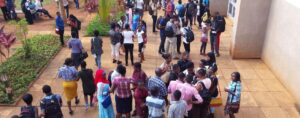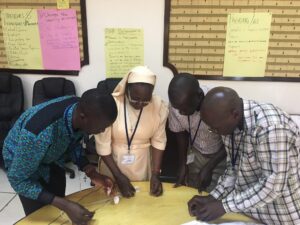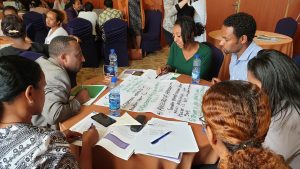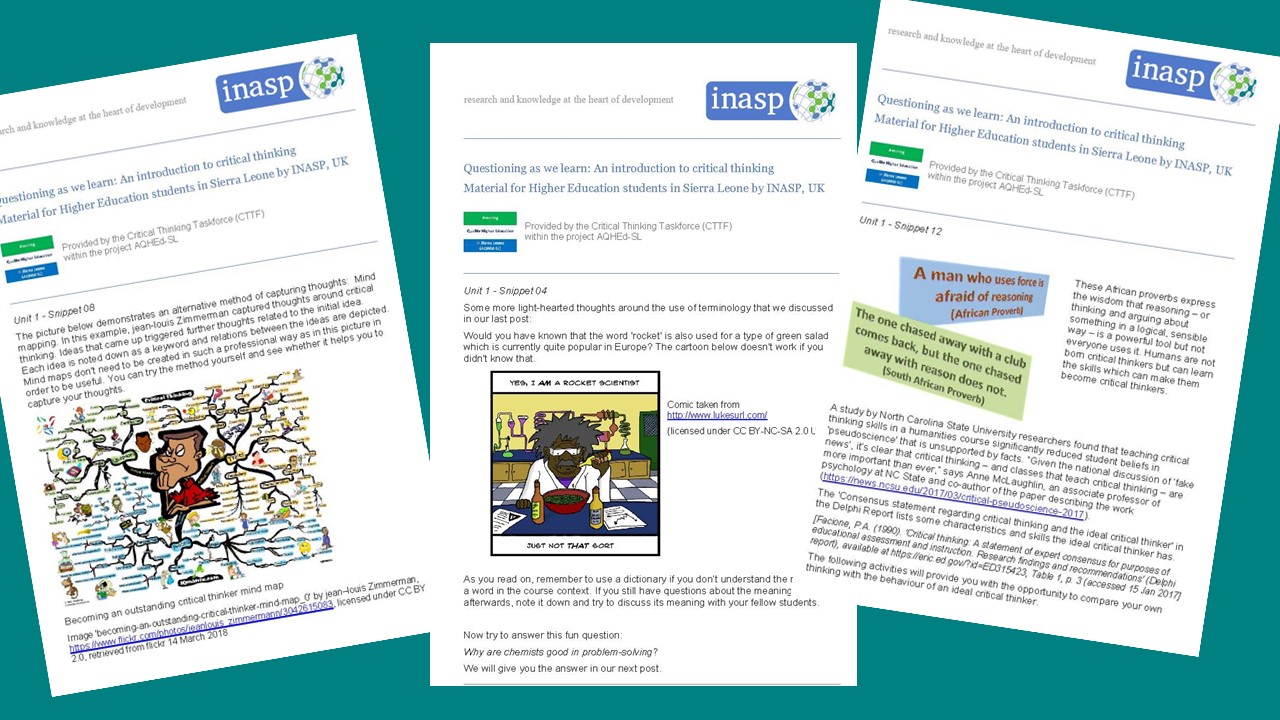
Helping Sierra Leone’s students develop their critical thinking skills during a pandemic
How do you support the development of critical thinking skills when a pandemic stops face-to-face engagement and internet infrastructure is fragile? Veronika Schaeffler discusses how INASP has adapted its support to higher education in Sierra Leone this year.
With so much information and misinformation available today, it is very important for people to be able to evaluate the trustworthiness of what they hear and read and to ask questions to dig more deeply. We have written previously about the importance of university students and researchers developing their critical thinking skills and how INASP is addressing this through online and blended learning.
Critical thinking is also a very important skill that employers look for in university graduates, as stakeholder meetings within the project ‘Assuring Quality Higher Education in Sierra Leone’ (AQHEd-SL) have revealed. Desk research for a sister project of AQHEd-SL, the Transforming Employability for Social Change in East Africa (TESCEA) partnership, confirmed that this is a common need at African higher-education institutions.
Both projects are partnerships within the FCDO-funded Strategic Partnerships for Higher Education Innovation and Reform (SPHEIR) programme. AQHEd-SL seeks to address challenges in Sierra Leone’s higher education system by bringing together higher education institutions across Sierra Leone to improve quality management in higher education and support the introduction and implementation of outcome-based education.
INASP’s main role in AQHEd-SL is to help lecturers in Sierra Leone identify new teaching and learning approaches around critical thinking.
Since the project’s launch in 2018, we have held workshops with lecturers and other staff at partner universities in Sierra Leone where they identified how to introduce critical thinking skills development into their curricula. As a result, a Critical Thinking Taskforce was set up across the partnership and universities developed action plans based on a blended approach, with a mixture of face-to-face and online learning.
This required some careful thinking. Although we had an online course available to be adapted – INASP had already developed an online course that had been piloted with universities in Tanzania – there are some particular issues with infrastructure in Sierra Leone, especially outside of the capital Freetown. There are frequent internet and electricity disruptions, and many students – and some lecturers too – only have access to the internet through their mobile phones. In addition, there are significant gaps in computer literacy skills. We began to explore the approach of institutions using standalone mobile devices such as Moodle boxes or small Raspberry Pis preloaded with the course so that they can serve a classroom with a local internet-independent network instead of delivering the course via the internet.
Then, of course, COVID-19 struck, universities across Sierra Leone closed and the AQHEd-SL partnership was faced with the challenge of continuing to work in another way, as AQHEd-SL Project Director Samuel Weekes of University of Sierra Leone discussed in this blog post.
The pandemic and university closures created a totally different situation for the critical thinking training. The Moodle box approach would no longer work as this was intended for blended learning, within the classroom where students could learn with an online course together with face-to-face lessons. With the universities closed, the lecturers were confronted with the need to use an online-only teaching environment within a context where internet access remained a challenge.
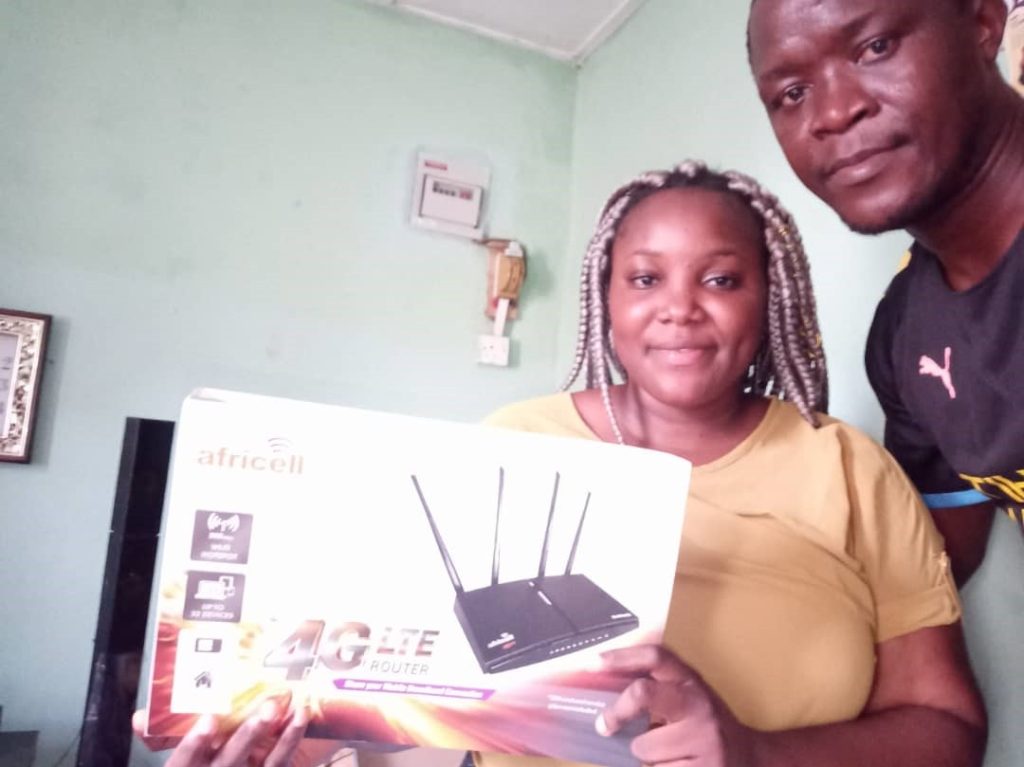
Understanding lecturers’ situations
We spent some time in the Critical Thinking Taskforce speaking with lecturers and finding out what is possible. Lecturers told us that WhatsApp usually works and that they had already set up some classes using it. Some also pointed to the university portals that some universities had set up for students and lecturers to share material with each other. Others noted that Zoom-based classes could work with some of their students.
Drawing on this contextual insight, we thought about how we could use the content of INASP’s online critical thinking course most effectively to complement lecturers’ approaches and support university students in Sierra Leone. We came up with three ideas: firstly, to extract snippets from the online course that could be sent out by the lecturers to the students via WhatsApp; secondly, to put the materials on university portals where already available; and thirdly, to use elements of the course within Zoom-based classes.
To support this approach, we provided materials from the online critical thinking course as Word documents so that lecturers could adjust them if they want to for their classes before putting on university portals and sharing with students. However, we also provided elements in PDF and JPEG formats in recognition that some lecturers needed something that they could very easily pass straight on to the students through WhatsApp.
Interaction is key in supporting critical thinking development so we were keen to retain this even in a situation where students were not in a classroom and could not discuss materials in the usual discussion forum of an online course. The materials therefore continued to ask students questions and encouraged them to discuss and trigger their critical thinking.
And we heard good examples from lecturers about how this was working. Mr Francis Peacock-Cole, lecturer at Fourah Bay College in Freetown who is also part of the AQHEd-SL Critical Thinking Taskforce, described the responses to an exercise shared via a snippet on WhatsApp. Students were asked to discuss the theory that a piece of paper cannot be folded more than eight times. The idea was for students to consider if they thought this theory was true, to try it out for themselves and to think about other ways to approach the problem that might bring different perspectives. Mr Peacock-Cole noted that this question sparked lively discussion and engagement: “The exercise about folding a paper eight times was interesting. Everyone was coming up with his own idea. And some went on to pose the question of ferrying a wolf, sheep and cassava leaves in a boat.”
This is exactly the kind of discussion that we wanted to have, triggering students’ own thinking and developing their critical thinking skills.
We also looked at providing Zoom classes using content from the critical thinking online course and thinking though which activities of the online course would work well in Zoom classes. Along with Dr Michael Lahai, one of the lecturers from the Critical Thinking Taskforce who teaches at the College of Medicine and Allied Health Sciences, we adjusted the course content to tailor it for their pharmacy students, especially to relate it to the current COVID-19 situation. The feedback was very positive from students. Dr Lahai reported that the lecture session was very interactive and went on for one and a half hours although he had planned it only for one hour, with many students requesting copies of the presentation afterwards. Again, that was what we had intended, a more interactive way for lecturers and students to experience that class.
COVID-19 has no doubt caused disruption to learning worldwide and it has particularly impacted countries like Sierra Leone where the infrastructure for enabling online access is more fragile. However, this situation has also opened up a new space and lecturers have shown a real readiness to try new things. What was very important in delivering the critical thinking course in new ways was that first stage of taking the time to listen to the lecturers in Sierra Leone, to find out what their situations were, what they could still do in the absence of face-to-face engagement with students, and what tools could be used. This step was so important for INASP and all members of the Critical Thinking Taskforce in finding the right solutions.
As the pandemic continues and as the AQHEd-SL partnership continues to adapt and develop, we look forward to reflecting more on what we have learned and how to continue to support the development of critical thinking skills in Sierra Leone’s students.
***
Assuring Quality Higher Education in Sierra Leone is bringing together higher education institutions across Sierra Leone to improve quality management in higher education and support the introduction and implementation of outcome-based education. It aims to bring about a student-centred focus within higher education across the country, leading to a more responsive and capable national workforce.
The partnership is led by the University of Sierra Leone (Sierra Leone), working with Njala University (Sierra Leone), the University of Makeni (Sierra Leone), Tertiary Education Commission (Sierra Leone), Sierra Leone Institution of Engineers (Sierra Leone), King’s College London (UK), the 50/50 Group, INASP (UK), and the University of Illinois (US).
AQHEd-SL is funded by the UK’s Foreign, Commonwealth & Development Office (FCDO) as part of its SPHEIR (Strategic Partnerships for Higher Education Innovation and Reform) programme to support higher education transformation in focus countries in Sub-Saharan Africa, Asia and the Middle East.

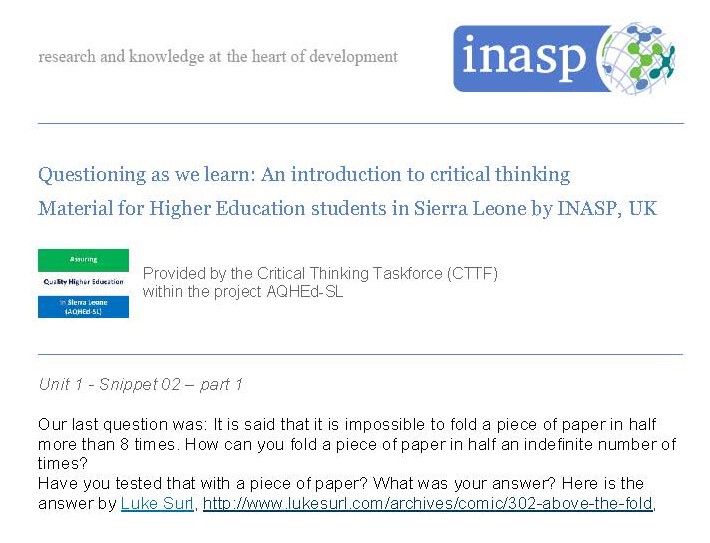
 Previous Post
Previous Post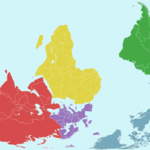 Next Post
Next Post